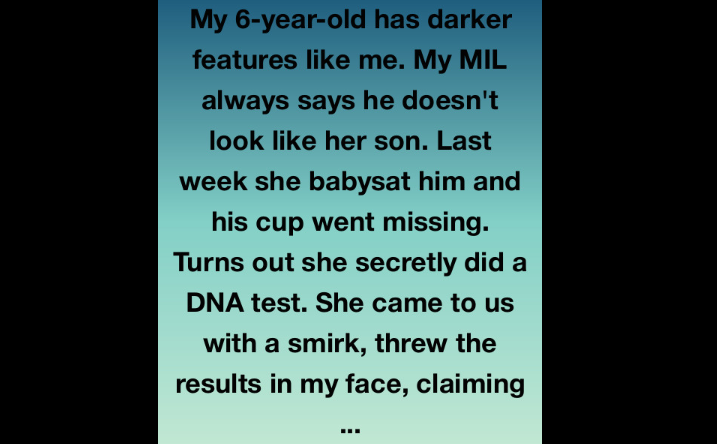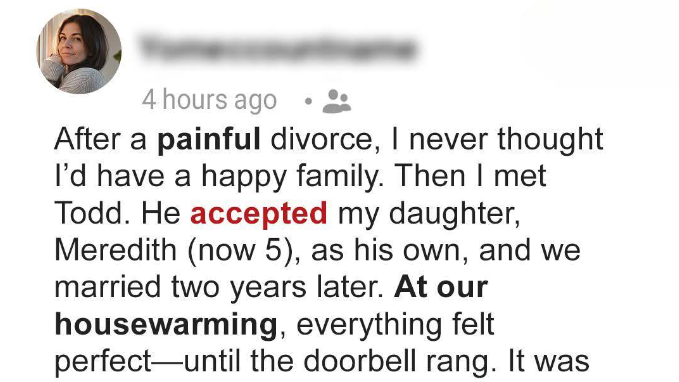My 6-year-old son shares my darker features, a trait that always stood out to my mother-in-law. She often remarked that he didn’t resemble her son, my husband. One evening last week, while she was watching him, his favorite cup vanished. Later, we discovered she had covertly performed a DNA test. With a triumphant expression, she presented the results to us, declaring, “I was certain he wasn’t ours!”
Shock rendered me speechless at first. Her demeanor suggested she had uncovered some great mystery. My husband stood beside me, motionless, equally stunned.
“Is this for real?” I managed to say. “You conducted a DNA test on my son without our knowledge?”
She remained silent, arms crossed, lips pursed. The folder lay open on the table, and I caught a glimpse of it.
The results indicated a 0% probability of paternity.
My stomach churned—not from guilt, but from the realization that something was deeply amiss. I turned to my husband, his face ashen. He stared at the paper, blinked repeatedly, and shook his head.
“This… this can’t be right,” he murmured.
My mother-in-law shot him a pointed look. “It’s perfectly clear. She betrayed you. I warned you years ago.”
I didn’t shout or weep. Instead, I reached for my phone and contacted our doctor. We needed a legitimate test, one done correctly. My husband nodded in agreement, his trust in me unwavering—or so I hoped.
The following days were heavy with unease, like a storm cloud lingering over our home. My husband never accused me, but his demeanor shifted subtly. I noticed flickers of uncertainty in his eyes when he thought I wasn’t watching.
Sleep eluded me. The violation of our trust, orchestrated by someone who misunderstood the science she wielded, gnawed at me. Something about the situation felt fundamentally wrong.
At the clinic, we requested a formal paternity test, ensuring proper protocol and supervision—no missing cups this time.
The nurse was kind, swabbing my husband and our son, who was more curious than anxious. He thought it was a fun experiment.
“Will this make me a superhero?” he asked with a grin.
I managed a faint smile. “You’re already one.”
The results arrived a week later. I barely slept the night before.
The nurse handed the envelope to my husband. He opened it carefully, his eyes scanning the page. I watched his face intently, my heart pounding.
He blinked, then again, and finally exhaled with a smile. “He’s mine.”
Relief flooded through me, mingled with tears and lingering anger. I fell into his arms, overwhelmed.
But one question remained: how had my mother-in-law’s test produced such a wildly inaccurate result?
We returned home, armed with the correct results, and confronted her together. My husband placed the new report on the table.
“Your test was mistaken,” he said firmly. “You nearly shattered our family.”
She picked up the paper, her expression dismissive. “How could that be? I sent it to a reputable lab.”
My husband’s face shifted, a realization dawning.
“Hold on,” he said. “Whose name did you put on the test?”
She frowned. “Yours, obviously. Why?”
“And the sample—it was from the red dinosaur cup, correct?”
“Yes, the one he always uses.”
Our son has two identical red dinosaur cups—one his, the other belonging to his friend Micah, who visits frequently. They’re from the same set.
That night, both boys had been at the house. They must have swapped cups.
It hit us like a revelation.
She had tested Micah’s saliva by mistake.
Micah, who looks nothing like our son or my husband, with his white father and Latina mother.
My mother-in-law’s face paled. “I… I didn’t realize…”
“No, you didn’t,” I said, my voice rising. “You had no right to invade our privacy, steal a child’s DNA, and make baseless accusations. You didn’t only wound me—you nearly broke your son.”
She tried to justify her actions, but it was futile. The harm was done.
My husband distanced himself from her for weeks. She sent calls, messages, flowers, cookies, even a lengthy email claiming “a mother’s instincts are never wrong.”
But hers were.
One day, she arrived uninvited, holding a small box.
“I owe you both an apology,” she said softly.
My husband opened the door, letting her in.
She moved slowly, looking weathered. “I was wrong,” she admitted. “I thought I was protecting my son, but I let my pride and ego take over. I’m sorry.”
We stayed silent. She offered the box.
Inside were baby photos of my husband—dark hair, olive skin, deep brown eyes.
“His features lightened as he grew,” she said quietly. “I forgot how much he resembled you as a child.”
Something in me softened—not forgiveness, but a small release of tension.
She looked at me. “I can’t erase what I did. But I’m willing to do whatever it takes to rebuild what I broke.”
Her words carried weight, though they didn’t heal everything.
We insisted on family counseling if she wanted to remain in our son’s life. She hesitated, thinking it excessive, but ultimately agreed.
In those sessions, truths surfaced.
She revealed insecurities from her own marriage, scarred by her husband’s infidelity decades ago. That unresolved pain had projected onto us.
It didn’t absolve her, but it offered clarity.
Over time, healing began.
Our son, blissfully unaware, only noticed Grandma’s temporary absence. He was too young to grasp the betrayal, but we weren’t.
Yet people can change if they choose to.
Months later, the counselor helped us establish boundaries. My mother-in-law continued sessions on her own, determined to grow. She even joined a support group for mothers estranged from their children, sharing her story candidly.
Something remarkable happened there.
Micah’s grandmother, a member of the group, recognized her. After one session, she approached.
“You know,” she said, “Micah’s parents were puzzled when his daycare mentioned a DNA test.”
My mother-in-law, embarrassed, explained and apologized.
The woman chuckled. “You owe me coffee and a good talk.”
From that, an unexpected friendship bloomed. The two grandmothers began volunteering together at the community center.
Life has a way of surprising you.
Our family grew stronger. My husband and I communicated more openly, trusted more deeply. We started monthly check-ins to stay connected.
The ordeal taught us profound lessons.
Here’s the unexpected truth: if that mistaken test hadn’t happened, my husband might never have realized the depth of his trust in me. True faith is revealed under pressure.
And my mother-in-law? She transformed.
She now leads a community workshop on generational trauma and respecting boundaries, opening each session with: “I nearly lost my family over a plastic cup.”
It’s true.
A cup nearly tore us apart.
But it also rebuilt us.
It showed us that those who hurt you most aren’t always malicious—just wounded in ways they haven’t yet faced. Healing is possible if they’re willing to confront it.
Here’s the heart of it:
Trust isn’t rooted in DNA. It’s built on love, respect, and showing up consistently, especially in tough times.
If you’ve been unfairly doubted or had your integrity questioned, stand tall. Truth rises, even when others try to suppress it.
And if you’ve doubted someone wrongly, it’s never too late to own it, learn, and grow.
We’re all navigating this journey together.
If this story resonates, share it. Someone out there might need its message today.




